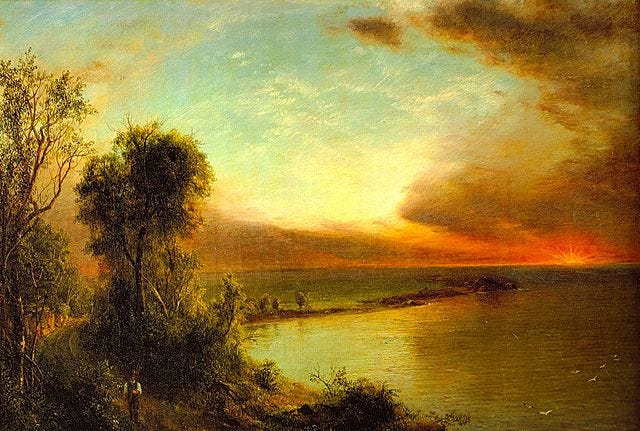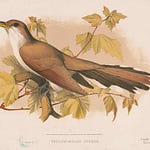In celebration of the two-year anniversary of Word & Song we are offering through July a special rate on paid, gift, and upgraded subscriptions.
Beginning on Friday, for Poetry Aloud (Friday podcasts) Dr. Esolen will read Huckleberry Finn, chapter by chapter, in its entirety!
Our Word of the Week has been sunshine, and that, you’d think, is the commonest thing in everybody’s experience. Every day we are aware of it, even if it’s just shining through the window. Little children are cheered by the sunlight, and eventually, if they have anything like a real child’s-life, they grow aware of other things about the sun. They notice that as the evening falls, the shadows lengthen, and if you could hardly glance at the sun at noon, you can now look at it for a moment or two, as it seems to be a pleasant yellow, and then, when it draws low to the horizon, it turns orange or red, and you can look at it without any trouble at all. And you notice, too, that the days are long in the summer, and if you pay attention — I’m assuming here that you live in the northern hemisphere — you will see that summer sun setting not west but north of west, depending on how far north you are, just as it rises not east but north of east. And how beautiful the evening sky is, when the shades in the west soften from red at the horizon to orange above it, and yellow above that, and then, sometimes, the palest green, some undefinable shade between light blue and a soft and hardly visible yellow, until you get the blue indeed.
We were told, when we were kids, that the sun at noontime is right overhead, but that is never the case unless you live between the tropics. If, for example, you live on the Tropic of Cancer, the sun will be directly overhead once a year, on the summer solstice. North of that, it will never be so, but on that day the sun will be the highest it ever gets for that particular place. How high? It depends on your latitude. Subtract 23 1/2 degrees, which is the tilt of the earth’s axis, from the latitude where you are, and that will give you the difference between the sun’s angle at noon on that day and straight over you. So here we are in New Hampshire, at 44 degrees north latitude, so at noon on the longest day of the year, the sun will be 20 1/2 degrees off from straight overhead, or you could say that it will be 69 1/2 degrees above the horizon. Anyhow, if you pay attention to where the sun is from day to day, you’ll notice that it doesn’t just rise in the east and set in the west. Its point of rising and setting — unless you live on the equator — changes, and its highest point at noon also changes. If you tracked it, it would look like a spiral.
And that’s what’s behind the metaphor in George Herbert’s, “Colossians 3:3,” our Poem of the Week. It’s common to think of your childhood as the morning of life, your prime as high noon, and then your growing old as settling into evening, as if all of life held the course of a single day. But Herbert reminds us that the sun — that is, the path of the sun as it appears to our observation — has another motion too. It spirals; it winds. As we go from the cold days to the height of summer, the sun’s course bends its way higher and higher. And that action, hidden to a quick glance and only discoverable by an attentive mind, suggests to him how we ought to think of our life on earth. We too ought to have that double motion. We go about our daily rounds, rising and falling, but we should have a motion that is secret, always spiraling higher and higher with every passing day, until the pinnacle of full daylight is attained.
Now here’s the amazing thing about this short poem. In itself it models the kind of hidden motion we ought to have. That’s because in each of the ten lines, Herbert italicizes a word, moving from the first beat in the first line, to the second in the second, all the way to the tenth in the tenth. We can thus read the poem from beginning to end in the ordinary way, in the “daily” way if you will, while noticing that the italicized and capitalized words on the diagonal, that “obliquely bend,” themselves make up a complete sentence, expressing the heart of Herbert’s meaning: My Life Is Hid In Him That Is My Treasure. Utterly remarkable. I know of no poem in any language that is quite like it.
Our life is hid in Christ with God My words & thoughts do both express this notion, That Life hath with the Sun a double motion. The first Is straight, and our diurnal friend; The other Hid and doth obliquely bend. One life is wrapt In flesh, and tends to earth. The other winds toward Him, whose happy birth Taught me to live here so, That still one eye Should aim and shoot at that which Is on high: Quitting with daily labor all My pleasure, To gain at harvest an eternal Treasure.
Listen to this episode with a 7-day free trial
Subscribe to Word & Song by Anthony Esolen to listen to this post and get 7 days of free access to the full post archives.













